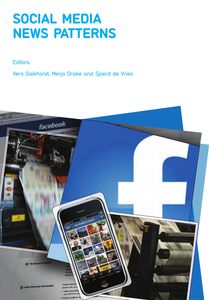A social media architect is an appealing new profession that entails crossovers between communication and IT & Design. There are no study programmes for this job. Important questions are how to interest secondary school pupils for such a new job, and how to prepare them for these jobs or jobs that do not even exist today? This research aims to set an example by presenting a realistic job profile of a social media architect by linking the ‘21st century skills’ to the context in which he/she operates.
DOCUMENT

In this paper we discuss the general approach and choices we made in developing a prototype of a social media monitor. The main goal of the museum monitor is to offer museum professionals and researchers better insight in the effects of their own social media usage and compare this with other actors in the cultural heritage sector. It gives researchers the opportunity to consider communication within the sector as whole. In the research project “Museum Compass” we have developed a prototype of a social media monitor, which contains data of current and historic online activities on Facebook, Twitter, YouTube, Foursquare and Flickr of all registered Dutch museums. We discuss – mostly in a practical sense – our approach for developing the monitor and give a few examples as a result of its usage.
DOCUMENT

Wereldwijd onderzoek: Hoe gebruiken nieuwsmedia social media? Jongeren lezen geen krant meer, ze kijken op hun smartphone die ze altijd bij de hand hebben. Binnen het lectoraat social media en reputatiemanagement van NHL hogeschool te Leeuwarden heeft een groep internationale studenten in 12 landen onderzoek gedaan. Hierbij hebben ze meer dan 150 social media sites bestudeerd van nieuws media. De resultaten maken deel uit van een internationaal onderzoek van NHL Hogeschool en Haaga Helia University. De onderzoeksvraag was: Wat speelt zich af in de nieuwsmedia? Persbureaus kunnen het overzicht gebruiken om hun social media te optimaliseren. En voor ieder die journalistiek een warm hart toedraagt is het interessante informatie over de nieuwsmedia in een overgangssituatie (2nd edition)
DOCUMENT

Ervaringsdeskundigheid in de zorg is sterk in opmars: hulpverleners die hun eigen persoonlijke ervaringen professioneel inzetten bij het herstel van hun cliënten. Onder andere beroeps-en gedragscodes en negatieve beeldvorming staan de optimale inzet hiervan in de weg. Dit promotieonderzoek wil de professionele inzet van ervaringsdeskundigheid in de geestelijke gezondheidszorg (GGZ) onderzoeken en verstevigen.Doel Dit promotieonderzoek heeft als doel om de professionele inzet van ervaringsdeskundigheid in de GGZ te onderzoeken en te verstevigen. Ervaringsdeskundigen hebben vaak creatieve oplossingen, zijn in staat om vanuit hun eigen ervaring aan te moedigen en kunnen helpen het stigma op psychische problemen te verminderen. Dit onderzoek gaat in op relationeel-ethische verschuivingen die plaatsvinden bij de implementatie van ervaringsdeskundigheid en de betekenis van die inkleuring. Het onderzoek wil een bijdrage te leveren aan zowel theorievorming, de waarde van ervaringsdeskundigheid en in het bijzonder een versteviging en verduurzaming daarvan binnen de (ggz) praktijk- en beroepsinnovatie. Een ander doel van het onderzoek is om de opleidingen Social Work te verrijken met nieuwe kennis over ervaringsdeskundigheid. Resultaten Dit onderzoek is een vervolg op eerder onderzoek, waarin we de ervaringsdeskundigheid onder zorgprofessionals onderzochten. Daaruit kwam een aantal interessante inzichten. 45% van de ondervraagde zorgprofessionals bleek zelf ervaring te hebben met de ggz. Zij gaven aan die te willen inzetten in hun werk, maar wisten niet altijd hoe ze hun persoonlijke ervaringen konden combineren met hun professionele rol. Cliënten reageerden over het algemeen goed op hulpverleners die hun eigen ervaring meenamen in de zorg. Maar in de organisaties is nog veel onwetendheid over deze nieuwe rol, met name onder regiebehandelaren (psychiaters en psychologen). In mei '22 vond het jaarlijkse congres plaats van de Nederlandse Vereniging voor Psychiatrie. De poster over het gebruik van ervaringskennis in de rol van psychiater won een aanmoedigingsprijs. Use of experiential knowledge by mental health professionals and its contribution to recovery: literature review Professionals harnessing experiential knowledge in Dutch mental health settings Lees meer over onze tussentijdse bevindingen in het artikel Ervaringskennis professionals draagt bij aan betere geestelijke gezondheidszorg Posterpresentatie ‘Resultaten voorstudie ervaringskennis onder zorgprofessionals’. Luister onderstaande aflevering uit de podcastserie Lessen uit #HUonderzoek met Simona Karbouniaris (ook te vinden via je favoriete podcastapp). Looptijd 01 maart 2019 - 01 maart 2023 Aanpak Hoewel veel zorgorganisaties moeten wennen aan het idee dat ook reeds werkende zorgprofessionals ervaringsdeskundig kunnen zijn en zich als zodanig profileren, is een groeiend aantal professionals met ervaringsdeskundigheid aan het werk. Deze zorgprofessionals hebben behoefte aan verdere validering van hun nieuwe rol, kennis en praktische handvatten teneinde hun ervaringsdeskundigheid adequaat te kunnen benutten. Dit wetenschappelijk onderzoek bestaat uit een literatuurstudie en een praktijkdeel. Er vindt kwalitatief participatief onderzoek plaats op drie niveaus in de organisatie: onder professionals met ervaringskennis en hun collega's; bij cliënten; bij de 3 participerende organisaties.
Ervaringsdeskundigheid in de zorg is sterk in opmars: hulpverleners die hun eigen persoonlijke ervaringen professioneel inzetten bij het herstel van hun cliënten. Onder andere beroeps-en gedragscodes en negatieve beeldvorming staan de optimale inzet hiervan in de weg. Dit promotieonderzoek wil de professionele inzet van ervaringsdeskundigheid in de geestelijke gezondheidszorg (GGZ) onderzoeken en verstevigen.

The HAS professorship Future Food Systems is performing applied research with students and external partners to transform our food system towards a more sustainable state. In this research it is not only a question of what is needed to achieve this, but also how and with whom. The governance of our food system needs rethinking to get the transformative momentum going in a democratic and constructive manner. Building on the professorship’s research agenda and involvement in the transdisciplinary NWA research project, the postdoc will explore collective ownership and inclusive participation as two key governance concepts for food system transformation. This will be done in a participatory manner, by learning from and with innovative bottom-up initiatives and practitioners from the field. By doing so, the postdoc will gain valuable practical insights that can aid to new approaches and (policy) interventions which foster a sustainable and just food system in the Netherlands and beyond. A strong connection between research and education is created via the active research involvement of students from different study programs, supervised by the postdoc (Dr. B. van Helvoirt). The acquired knowledge is embedded in education by the postdoc by incorporating it into HAS study program curricula and courses. In addition, it will contribute to the further professional development of qualitative research skills among HAS students and staff. Through scientific, policy and popular publications, participation in (inter)national conferences and meetings with experts and practitioners, the exposure and network of the postdoc and HAS in the field of food systems and governance will be expanded. This will allow for the setting up of a continuous research effort on this topic within the professorship via follow-up research with knowledge institutes, civic society groups and partners from the professional field.